

English | 2009 | ISBN: 0415997038 | 273 Pages | PDF | 2,7 MB In The Creative Therapist, Bradford Keeney makes the case that "creativity is the most essential aspect of vibrant, meaningful, and successful therapy.
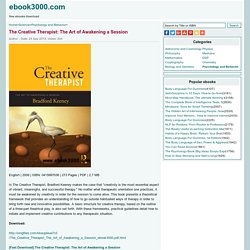
" No matter what therapeutic orientation one practices, it must be awakened by creativity in order for the session to come alive. This book presents a theoretical framework that provides an understanding of how to go outside habituated ways of therapy in order to bring forth new and innovative possibilities. A basic structure for creative therapy, based on the outline of a three-part theatrical play, is also set forth.
With these frameworks, practical guidelines detail how to initiate and implement creative contributions to any therapeutic situation. Download: [Fast Download] The Creative Therapist: The Art of Awakening a Session Copyright Disclaimer: This site does not store any files on its server. English | 2005 | ISBN: 1592700462 | 224 pages | PDF | 10,5 MB An excellent guide through a complex and fascinating world of ideas that is sure to provoke further investigation.Knowledge and the sudden experience of understanding can be as thrilling as the solution to any puzzle or riddle, since knowledge always resolves a mystery-that of not knowing.
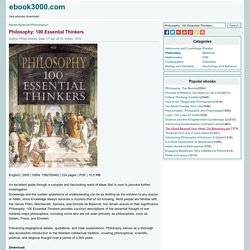
S,,,ger | 2012 | ISBN: 3642257062 | 346 pages | PDF | 5,7 MB This proceedings volume contains a selection of papers presented at the Fourth International Conference on High Performance Scientific Computing held at the Hanoi Institute of Mathematics, Vietnamese Academy of Science and Technology (VAST) March 2-6, 2009.
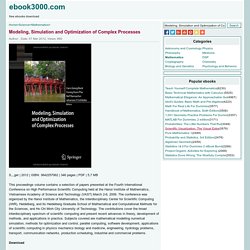
The conference was organized by the Hanoi Institute of Mathematics, the Interdisciplinary Center for Scientific Computing (IWR), Heidelberg, and its Heidelberg Graduate School of Mathematical and Computational Methods for the Sciences, and Ho Chi Minh City University of Technology. The contributions cover the broad interdisciplinary spectrum of scientific computing and present recent advances in theory, development of methods, and applications in practice.
[Fast Download] Modeling, Simulation and Optimization of Complex Processes Copyright Disclaimer: This site does not store any files on its server. 2005 | 272 Pages | ISBN: 0141007222 | EPUB | 3 MB 'Gribbin takes us through the basics with his customary talent for accessibility and clarity' - "Sunday Times".
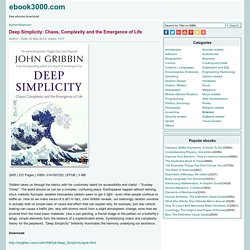
The world around us can be a complex, confusing place. Earthquakes happen without warning, stock markets fluctuate, weather forecasters seldom seem to get it right - even other people continue to baffle us. How do we make sense of it all? In fact, John Gribbin reveals, our seemingly random universe is actually built on simple laws of cause and effect that can explain why, for example, just one vehicle braking can cause a traffic jam; why wild storms result from a slight atmospheric change; even how we evolved from the most basic materials. 2011 | 252 Pages | ISBN: 0521764203 , 0521757533 | PDF | 2 MB Bridging the gap between theory and practice, this strikingly original analysis of the complex dynamics of high-risk fields demonstrates that teamwork is more important than technical prowess in averting disasters.

Thinking through Crisis narrates critical incidents from initiation to resolution in five elegantly constructed case studies: the USS Greenville collision, the Hillsborough football crush, the American Airline flight 587 in-flight breakup, the Bristol Hospital pediatric fatalities, and the US Airways flight 1549 Hudson River landing. English | 2015 | ISBN: 0823257487, 0823257479 | 176 Pages | PDF | 1,2 MB Figures of a Changing World offers a dramatic new account of cultural change, an account based on the distinction between two familiar rhetorical figures, metonymy and metaphor.
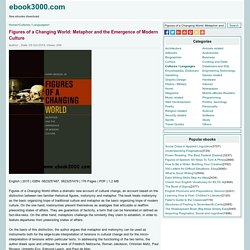
The book treats metonymy as the basic organizing trope of traditional culture and metaphor as the basic organizing trope of modern culture. On the one hand, metonymies present themselves as analogies that articulate or reaffirm preexisting states of affairs. They are guarantors of facticity, a term that can be translated or defined as fact-like-ness.
On the other hand, metaphors challenge the similarity they claim to establish, in order to feature departures from preexisting states of affairs. On the basis of this distinction, the author argues that metaphor and metonymy can be used as instruments both for the large-scale interpretation of tensions in cultural change and for the micro-interpretation of tensions within particular texts. 2009 | ISBN: 1402096623, 9048181798 | English | 492 Pages | PDF | 14 MB Innovation is nowadays a question of life and death for many of the economies of the western world.
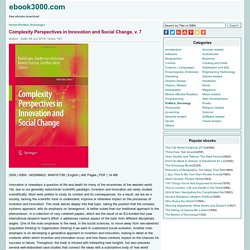
Yet, due to our generally reductionist scientific paradigm, invention and innovation are rarely studied scientifically. Most work prefers to study its context and its consequences. As a result, we are as a society, lacking the scientific tools to understand, improve or otherwise impact on the processes of invention and innovation. This book delves deeply into that topic, taking the position that the complex systems approach, with its emphasis on 'emergence', is better suited than our traditional approach to the phenomenon.
2010 | 240 Pages | ISBN: 8847017777 | PDF | 3 MB In economics agents are assumed to choose on the basis of rational calculations aimed at the maximization of their pleasure or profit.
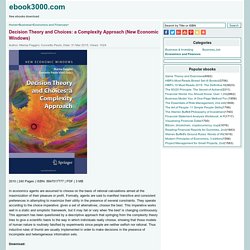
Formally, agents are said to manifest transitive and consistent preferences in attempting to maximize their utility in the presence of several constraints. They operate according to the choice imperative: given a set of alternatives, choose the best. This imperative works well in a static and simplistic framework, but it may fail or vary when 'the best' is changing continuously. This approach has been questioned by a descriptive approach that springing from the complexity theory tries to give a scientific basis to the way in which individuals really choose, showing that those models of human nature is routinely falsified by experiments since people are neither selfish nor rational.
English | 1998 | ISBN: 0674808207 | 378 Pages | PDF | 13 MB Too many laws, too many lawyersthat's the necessary consequence of a complex society, or so conventional wisdom has it.
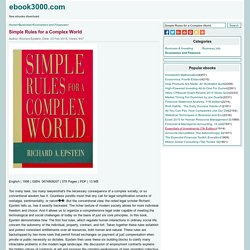
Countless pundits insist that any call for legal simplification smacks of nostalgia, sentimentality, or naivet. But the conventional view, the noted legal scholar Richard Epstein tells us, has it exactly backward. The richer texture of modern society allows for more individual freedom and choice. And it allows us to organize a comprehensive legal order capable of meeting the technological and social challenges of today on the basis of just six core principles. Author: Michael S.
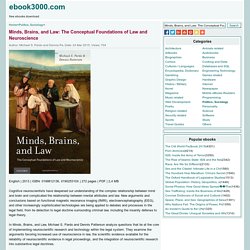
Pardo and Dennis Pa, Date: 24 Mar 2015, Views: 704 English | 2013 | ISBN: 0199812136, 019025310X | 272 pages | PDF | 2,4 MB. English | 2007 | ISBN: 0470510722 | 312 pages | PDF | 2.05 MB This book delivers new IMD insights on an emerging challenge - how to deal with overwhelming complexity. Global organizations face a complex decision-making environment. 2011 | 376 Pages | ISBN: 9048199379 | PDF | 4 MB In recent times there has been growing interest in positive psychology as evidenced by the swell in positive psychology graduate programs, undergraduate courses, journals related to the topic, popular book titles on the topic and scholarly publications.
Within the positive psychology community there has been an increased emphasis on the socially beneficial side of positive psychological science. At the First World Congress of the International Positive Psychology Association there was a major push to look at positive psychology as a social change mechanism. This volume will bring together thoughts of leaders in positive psychology from 8 countries to capitalize on the push toward social change and flourishing. By releasing this title at a critical time Springer has the opportunity to help frame the agenda for positive psychology as a force for social change. 2010 | ISBN-10: 1433808617 | 224 Pages | PDF | 1 MB Human beings possess the unique psychological ability to self-reflect. Few human experiences and behaviors define the self and allow us to characterize ourselves within the social world more than work and career. The pressing economic and social conditions of the information and globalization age require workers to be more self-directed by managing their own work lives, rather than solely relying on organizations to support them.
Given these shifting occupational structures, it is time to reassess the long-standing emphasis on fitting workers to jobs and move toward empowering them to adapt to change.